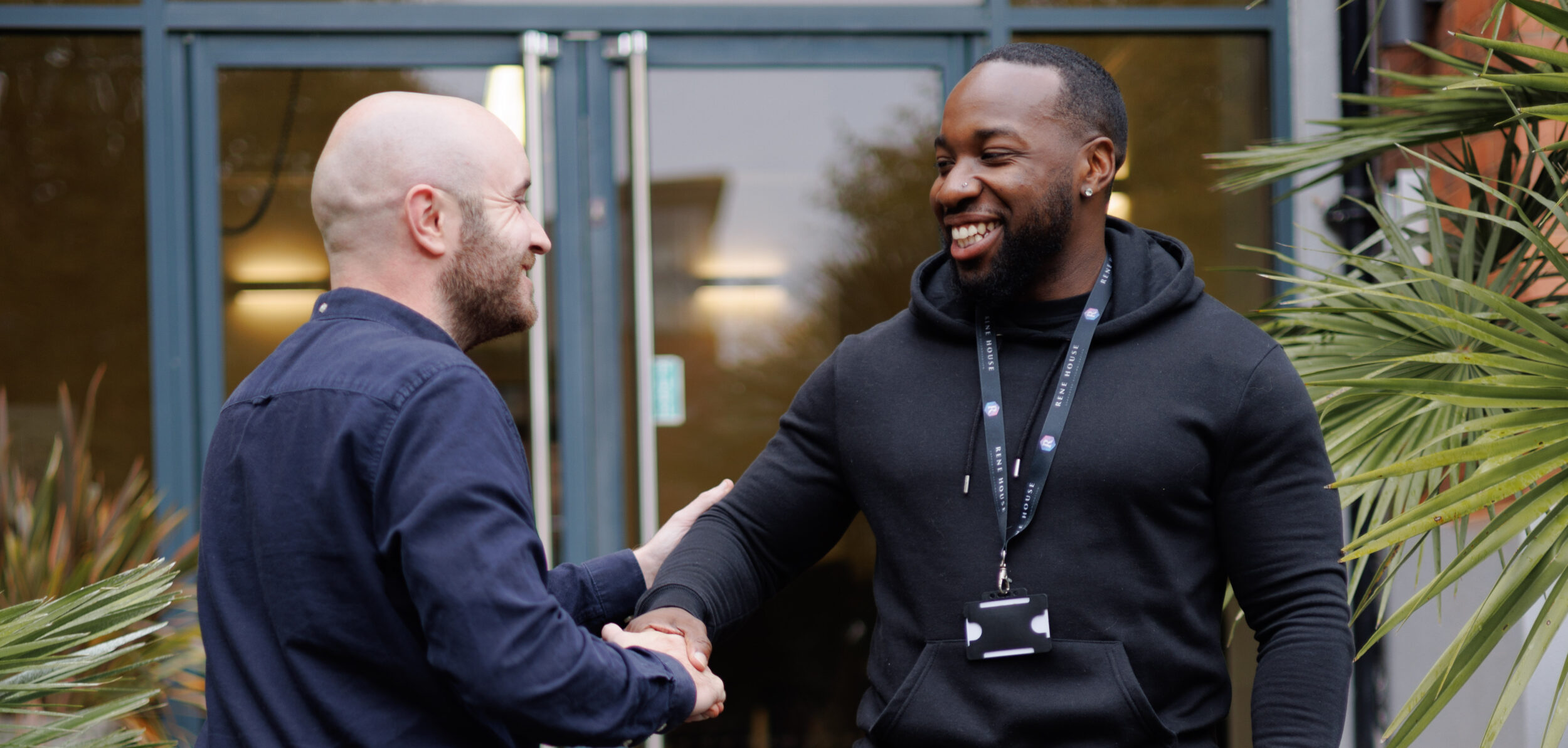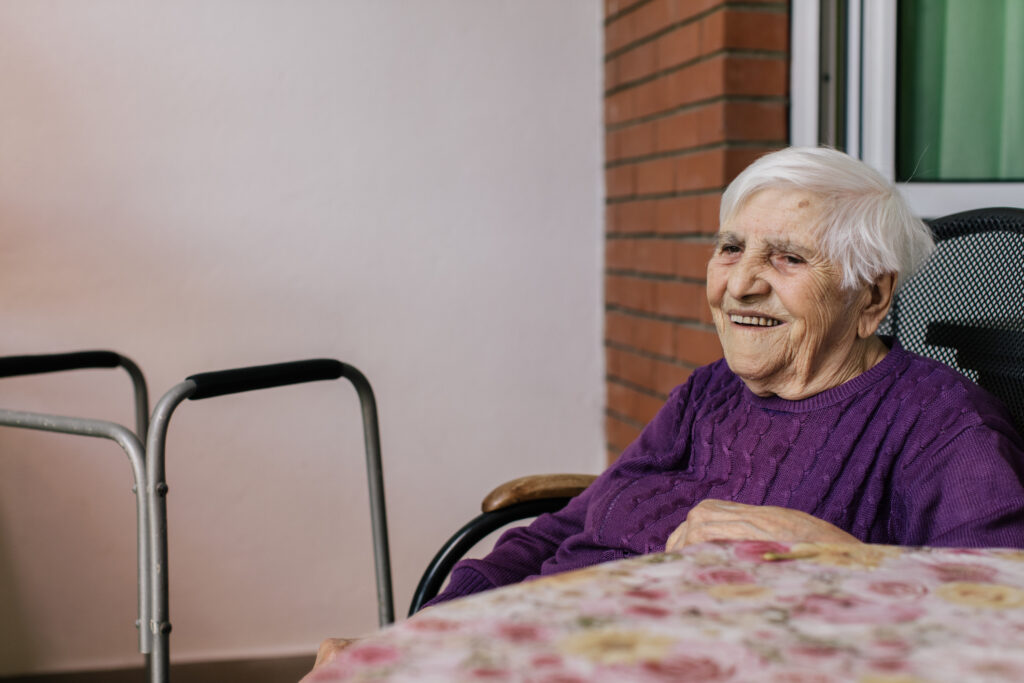
“Charity Bank has gone above and beyond”
“What you get with Charity Bank is understanding. They understand our structure, our model and how we work financially.” Read about René House’s experience of getting a loan.
Homelessness charity René House was founded by Tiffany Brierley and Theo Brown in 2018. Five years later, the CIC provides homes for 69 people.
Why did you set up René House?
Tiffany: We were both keen to work in property and there’s a clear need for homelessness support in Nottingham. We spoke to lots of people who were homeless or who had been homeless, and they told us that the accommodation they were given always felt temporary. It wasn’t great quality and it never felt like an actual home.
Our background isn’t in homelessness, so we decided to approach it with the mindset of providing really nice homes for people, and arranging packages of extra support that are tailored to the individual.
While the accommodation might not be long-term, people still deserve to live somewhere that feels like it’s their home rather than just a roof above their head. And they need support to move on in their lives, not just a bed for the night.
You’ve had a £90,000 loan from Charity Bank, which you’ve used to refinance an existing loan. Can you tell us about that?
Theo: It’s been quite difficult to make our business model work. The original loan from Big Issue Invest was a massive help, as it gave us a runway to tweak things and find a way to make our model work. We’ve moved forward a lot, but we’re still adapting the model and to do that, we needed to extend our runway. Restructuring our loan to have a longer repayment period meant that we could reduce our monthly payments. It also meant we could borrow a bit of extra money on top to implement the changes that we need to make.
What kind of improvements are you making?
Theo: We’re making some of our properties more energy efficient to save money in the long run. We’ve also been able to hire staff to improve our processes and make sure that our business operations are more efficient. We’ve set aside a bit of ‘what if’ money too, which will act as a buffer if anything unexpected crops up.
I’m quite a cautious person; I always try to anticipate the worst-case scenario and to make sure that we’re in the position to manage that scenario.
As part of the arrangement, you’ve been given a £20,000 LEAP grant. Could you have got that without the loan?
Theo: No, we couldn’t have got the grant without the loan. The grant will be used to help with general running costs. At the moment, elements of the support we offer to tenants aren’t covered by the housing benefit that we receive. We’re sourcing alternative funding for those cost centres, but the grant will give us some breathing space.
Is the loan secured on one of your properties?
No, we lease all of our properties. We’ve signed a debenture. Basically, if we had to wind the company up, Charity Bank would be first in the queue to get paid any money owing.
Why did you choose Charity Bank for your loan?
Theo: Relationships are so important when you’re running a business. The investment manager at Charity Bank, Alan Tudhope, was the same person who got us the original loan from Big Issue Invest.
He’s been amazing; I can’t speak highly enough of him. He’s supported me personally through the loan process and has gone above and beyond. He even jumped on a Zoom call with us when he was on holiday to get the latest loan over the line. He really believes in what we do.
Tiffany: What you get with lenders like Charity Bank is a real understanding of what you’re doing. They understand our structure, our model and how we work financially.
Theo: With a high-street bank, it’s a much more difficult conversation than when you’re talking to someone in the third sector who understands the challenges and complexities of what you’re doing. I tried speaking to a couple of high-street banks but couldn’t even get past the first hurdle.
Did you work with anyone else at Charity Bank to get your loan approved?
Yes. Towards the later stages, Stacey Goodrich supported us with the paperwork, contracts and so on. Again, she was sending emails while she was on annual leave to keep things moving forward. We were under a real time pressure to draw down the funding, so I was massively grateful to the Charity Bank team for going above and beyond.
How did you find the loan process itself? Was it what you were expecting?
Theo: When we got the Big Issue Invest loan, it was the first time I’d done a funding application. This time around, I had a better understanding of the process, so it was all pretty straightforward. There were a few different clauses that I needed to familiarise myself with, but Alan and the team took the time to make sure that I understood everything and knew exactly what I was signing up for. They also made sure that it was the right thing for us as a community interest company.
Was that reassuring, that Charity Bank cared about making sure the loan was the right thing for René House?
Theo: Yes, definitely. I didn’t feel any pressure to take the loan. I’ve worked in banking myself, so I’ve been on the other side of the table, and there was a lot of pressure on me to sell financial products to people who may or may not have needed those services. Whereas, with Charity Bank, I never felt like I was being sold to. It was just a case of, “We’re here; these are our terms; this is what we can do for you; and this is what we need from you.” It’s a give and take relationship.
It’s really difficult, nowadays, to have that kind of relationship with a bank and have an investment manager who you can just pick up the phone to. I feel comfortable that if things don’t go to plan, then we’ll be able to have a conversation about what to do, rather than the bank automatically calling in the loan to recoup their losses. It’s nice to be able to talk to real people!
Is there anything that other housing providers should be aware of before they apply for a loan?
Tiffany: Make sure that you know your organisation well, because there is a due diligence process to go through. If you don’t know all the answers, there are people at Charity Bank to support you, but knowing as much as possible about your organisation beforehand will make the process quicker and smoother.
Theo: I agree. You really need to understand your finances, including where your money is coming from and where it’s going. You also need to know how you’re going to be sustainable over the long term, taking into account things outside of your control, such as changes to the housing market and local authority budgets.
That said, getting a loan is actually a really useful process because it forces you to learn more about your organisation and maybe collect data that you weren’t collecting before. As we’d been through the process with Big Issue, we’d got used to collating all the information we needed in one place. That meant that when Charity Bank asked for something, I could usually access it within a couple of clicks rather than having to dig it out.
Do you think it’s important for companies like yourself to have access to ethical banking services and know where your repayments are going?
Tiffany: Definitely. We’re very blessed to have been given this loan. Knowing that the money that we’re paying back then goes to supporting someone else in a similar situation is a really good feeling. It’s giving someone else that same opportunity that we’ve had. At the end of the day, we’re in this business to help people.
What’s next for René House?
Theo: We’ve done a lot of work on our business model and are feeling really positive about the direction we’re going in. We currently provide housing for 69 people, but as mentioned, we lease all of our properties. We now want to start building a portfolio of properties that we own. So, in a couple of months or so, we’re aiming to have another conversation with Alan about a new loan, this time to buy a property.
Why do you want to move to owning properties rather than leasing them?
Tiffany: Our landlords are great, but there’s always the risk that they’ll want the property back. Owning our properties will give both us and our tenants extra security. And it means we have greater control over our future. Plus, it makes more financial sense.
However, at the moment, our main focus is on making sure that we have a solid foundation so that the organisation is sustainable for the long term. And the Charity Bank loan is helping us to do that.
If you need a loan for your CIC, please contact Charity Bank via email on [email protected]
About Charity Bank
Charity Bank is the loans and savings bank owned by and committed to supporting the social sector. Since 2002, we have used our savers’ money to make more than 1400 loans totalling over £605m to housing, education, social care, community and other social purpose organisations.
Nothing in this article constitutes an invitation to engage in investment activity nor is it advice or a recommendation and professional advice should be taken before any course of action is pursued.


